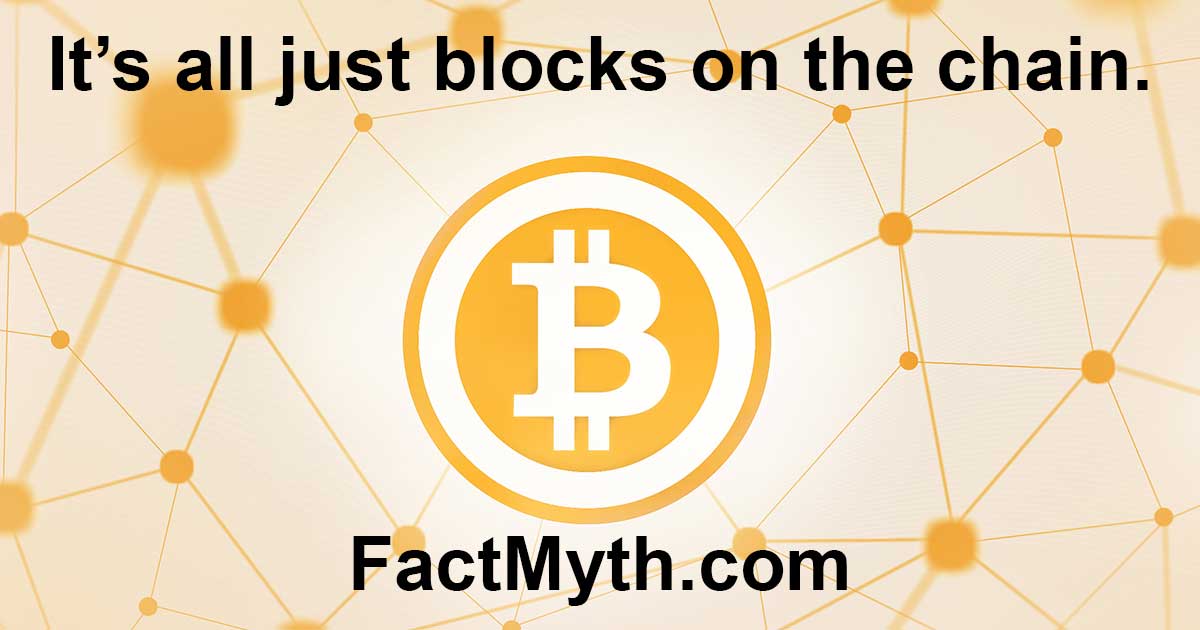The author also runs a website called cryptocurrencyfacts.com.
Bitcoin is an Actual Coin myth

What is Bitcoin?
Bitcoin isn’t a literal coin; it’s a list of transactions recorded on a shared digital public ledger called a “block chain”. All “coins” are stored in digital bitcoin “wallets” and can be verified against the ledger. Verifying transactions is done using cryptography in a process known as “bitcoin mining”. Bitcoin is set to allow one block to be added to the chain every ten minutes by miners. When transactions are added, new coins are created and paid to miners. This process helps control the rate at which new currency is introduced to the bitcoin economy and helps protect against fraud.
TIP: Want to start trading cryptocurrencies like Bitcoin? Check out our guide to cryptocurrency trading featured on our sister site cryptocurrencyfacts.com: Beginners Guide Trading Cryptocurrency Everything You Need to Know to Start Trading Cryptocurrencies Like BitCoin, LiteCoin, and Ethereum.
The best Bitcoin explainer on the net, thank me later.FACT: A bitcoin isn’t a tangible coin, a bitcoin wallet isn’t a wallet you can pick up in your hands, and a bitcoin miner doesn’t actually mine anything.
TIP: Bitcoin is one of many cryptocurrencies. All electronic currency that uses cryptography is a cryptocurrency, the name typically implies that it isn’t government controlled.
Bitcoin works like this:
- Person A has a digital Bitcoin wallet that allows them to store, send, and receive bitcoin.
- All coins a person owns can be verified by checking a public ledger where transactions are recorded in a sequential order (block chain).
- The fact that the ledger is public prevents any one person from editing the ledger for the purposes of fraud.
- Person A does a transaction with person B. To do this they create a public password (public key) that is attached to X amount of bitcoin in their wallet via a private key.
- Once a transaction is made the “miners” use cryptography computing to match the public key and private key to verify the transaction. The first miner to verify the transaction correctly get’s a small amount of bitcoin for playing virtual accountant. This is how new coins are created.
- Many miners try to solve the same cryptographic problem simultaneously and most will get the same answer. The most common answer is considered to be the true answer. This helps to prevent fraud.
What is Bitcoin Mining?
Mining involves using computers programed to run cryptographic algorithms that attempt to solve cryptographic codes. This process is essential to ensuring the accuracy and security of the public ledger and results in small amounts of bitcoin being created and paid to the miners.
Bitcoin is set to record one transaction every 10 minutes, the difficulty of the code changes to ensure a steady flow of bitcoin until all bitcoins are released. The current difficultly results in miners typically forming groups to combine computing power and improve performance. You can join a mining group, or mine independently with any CPU a mining program is installed on, but smaller slower computers mine slower and are less efficient.
Understanding the Basics of Cryptography
If the above explanation is difficult to understand, that is probably because you need to re-read it after understanding the basics of cryptography. Cryptography is the art of studying and writing codes and it is the fundamental concept behind how bitcoin works. Bitcoin is a “cryptocurrency”.
A Bitcoin has real value, but it’s not actual physical currency. It’s a decentralized cryptocurrency that only exists as numbers recorded on a public ledger.
- “What is Bitcoin?“. Cryptocurrencyfacts.com. Nov 24, 2015.
- “The science of encryption: prime numbers and mod n arithmetic“. math.berkeley.edu. Nov 24, 2015.
- “Semiprime“. Wikipedia.org. Nov 24, 2015.
